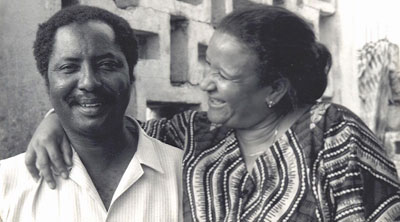In the eight years since unidentified assailants shot and killed Deyda Hydara of the Gambia, no one has been held to account. The late 2004 murder of Hydara, an immensely respected editor, columnist, and press freedom advocate known for his criticism of President Yahya Jammeh’s repressive media policies, became a rallying point for Gambian journalists and the human rights community–a symbol of the violent means by which activists and journalists are silenced and of the impunity that envelops acts of intimidation, ranging from arson to torture and murder.
Colleagues, family, and campaigners around the world who have sought justice for Hydara have been met with open defiance and disrespect by Jammeh. He has locked up journalists who question his commitment to the case, such as in 2009. And with so much time passed, it might seem there is little to be done to achieve justice.
But this is not so. Far more can and should be done.
An international inquiry should proceed without delay. In 2011, Jammeh invited the U.N. to investigate Hydara’s murder and the case of journalist “Chief” Ebrima Manneh, who has been missing since 2006. The U.N. Human Rights Council agreed to launch an inquiry earlier this year, but the process is stalled since Jammeh has failed to act on the UNHRC’s request to name an official point person. An inquiry should move ahead regardless of whether Jammeh gives full cooperation. This year the U.N. adopted a plan of action committing to coordinated and concerted action to protect journalists and address impunity. This would be one immediate way to follow through.
Members of the Economic Community of West African States (ECOWAS) must speak out and show that Gambia’s record of human rights violations, abuse of journalists, disregard for justice, and flouting of its regional obligations renders it unfit to be a member of the organization. In 2011, the Open Society Justice Initiative filed a lawsuit with the ECOWAS court against the Gambian government on behalf of the Hydara family, arguing that the Gambian government failed to conduct a proper investigation into his shooting and that it contributed to the attack on his life by tolerating a general climate of impunity for violence against critics of the regime. The regional tribunal already found the government responsible for the disappearance of Manneh and the torturing of another journalist, Musa Saidykhan. The Gambia has not complied with either ruling.
At a recent roundtable on human rights in the Gambia held at the U.K. House of Commons, participants suggested that the Commonwealth Ministerial Action Group (CMAG), which deals with perceived violations of the Commonwealth principles and values, review conditions in the Gambia, including the status of the investigation into Hydara’s case.
Governments providing aid (Taiwan) to the Gambia as well training and support to its military (United States, United Kingdom) must be reminded to raise this case and demand its full investigation according to international standards. In 2010, the European Union cancelled some 15 million euros ($19.7 million) of support due to human rights and governance concerns. Taiwan now bolsters the West African nation–one of few countries that recognize Taiwan’s statehood. If Taiwan condemned Gambia’s impunity record in this and other cases, it would be difficult for the Gambia to ignore.
Concerned individuals should contact their own political representatives–congressmen or parliamentarians, among others–to press them to raise the case in international forums directly with the Gambia and with leadership of other states of influence. Individuals can also sign up with CPJ’s Speak Justice Now campaign to be heard on this and so many other cases of journalists who have been murdered without consequence.
And finally, Gambian authorities should do their jobs. Hydara’s case is solvable. There are witnesses–two of whom were injured with Hydara at the time of the attack but never interviewed–forensics, and a body of journalistic work to examine. But not even a post-mortem examination has been produced for the journalist’s family. The only report made public in 2005 was described by colleagues as more of an indictment of Hydara’s character than an investigation.
Recently, Jammeh showed he is not impervious to pressure when he declared a moratorium on executions of death-row prisoners following an international outcry against the killing of nine inmates by firing squad. Jammeh has deflected questions about Deyda Hydara for nearly a decade but if we keep asking them from all sides, we might get some answers.
